
EURASIAN SOIL SCIENCE
Scope & Guideline
Illuminating the path to better earth and soil practices.
Introduction
Aims and Scopes
- Soil Erosion and Conservation:
Research on soil erosion processes, their quantification, and effective conservation measures is a major focus, addressing issues of land degradation and sustainability. - Soil Pollution and Remediation:
Studies investigating the impact of pollutants, including heavy metals and organic contaminants, on soil health and exploring bioremediation strategies are prevalent. - Soil Microbiology and Ecosystem Functioning:
The journal features research on microbial communities, their roles in soil health, and how environmental changes affect microbial dynamics. - Soil Physical and Chemical Properties:
Investigations into the physical and chemical characteristics of soils, including water holding capacity, nutrient availability, and their implications for agricultural productivity. - Digital Soil Mapping and Modeling:
Innovative methodologies for soil mapping, including remote sensing and predictive modeling techniques, are highlighted to enhance soil management practices. - Soil-Plant Relationships:
Research exploring the interactions between soil properties and plant growth, focusing on nutrient uptake and the effects of soil amendments.
Trending and Emerging
- Soil Carbon Sequestration:
Increasing attention is being given to the role of soils in carbon storage and its implications for climate change mitigation, highlighting the importance of soil management practices. - Impact of Climate Change on Soil Dynamics:
Research exploring how climate change affects soil properties, erosion rates, and microbial communities is becoming more prominent, reflecting global environmental concerns. - Use of Advanced Technologies in Soil Science:
The integration of technologies such as remote sensing, machine learning, and digital soil mapping in soil research is on the rise, improving data accuracy and management. - Soil Biogeochemistry:
Emerging studies focus on the biogeochemical cycles within soils, particularly regarding nutrient dynamics and the interactions between soil microorganisms and nutrients. - Urban Soil Studies:
Urban soil research is gaining traction, addressing issues related to soil health in urban environments and the implications of anthropogenic activities on soil properties.
Declining or Waning
- Paleopedology and Historical Soil Studies:
Research focusing on ancient soils and their historical significance has seen a decline, potentially due to a shift towards more contemporary soil management issues. - Traditional Soil Classification Systems:
There is a waning emphasis on traditional soil classification methods, as newer digital mapping and modeling approaches gain traction. - Soil Fertility and Crop Yield Studies:
While still important, studies specifically aimed at linking soil fertility directly to crop yields are becoming less frequent, possibly overshadowed by broader ecological and environmental research themes.
Similar Journals

Spanish Journal of Soil Science
Cultivating Knowledge for Global Soil SolutionsThe Spanish Journal of Soil Science is a prestigious open-access journal published by FRONTIERS MEDIA SA since 2011. Based in Switzerland, this journal serves as a vital platform for disseminating innovative research and applications within the field of soil science. With its commitment to accessibility, the journal enables researchers, professionals, and students from around the globe to contribute to and benefit from its wealth of knowledge. As of 2023, it holds a respectable Q3 category ranking in soil science and is positioned at #88 out of 159 in the Scopus rankings for Agricultural and Biological Sciences. The journal aspires to foster collaboration and communication among soil scientists, encouraging the exploration of contemporary soil issues, sustainable practices, and advancements in technology. Its open-access model ensures that the latest findings are freely available, promoting a broader impact in environmental and ecological studies.

Frontiers in Soil Science
Empowering soil science for global impact.Frontiers in Soil Science, published by FRONTIERS MEDIA SA in Switzerland, is an esteemed open-access journal dedicated to advancing our understanding of soil systems and their vital role in ecosystem functioning and sustainable agricultural practices. Since its inception in 2021, this journal has quickly established itself within the scientific community, boasting a 2023 Scopus Q2 ranking in Soil Science and a notable percentile of 41 among its peers. Researchers and practitioners in the field will find a wide array of original research, reviews, and contributions that address key topics such as soil health, carbon sequestration, and nutrient cycling. With a commitment to fostering collaboration and dissemination of knowledge, Frontiers in Soil Science serves as a vital resource for professionals, researchers, and students who aspire to innovate and lead in soil science research.

SOIL & TILLAGE RESEARCH
Exploring Innovations in Soil ManagementSOIL & TILLAGE RESEARCH is a premier international journal dedicated to advancing the understanding of soil science and tillage practices through high-quality research and insightful reviews. Published by Elsevier and based in the Netherlands, this esteemed journal boasts impressive impact metrics, being ranked in the Q1 category across multiple domains including Agronomy and Crop Science, Earth-Surface Processes, and Soil Science, reflecting its pivotal role in the academic community. With an H-Index that underscores its citation impact and a Scopus ranking placing it in the top percentiles of its field, SOIL & TILLAGE RESEARCH serves as a vital resource for researchers and professionals focusing on sustainable agricultural practices, soil management, and environmental conservation. This journal provides a platform for open dialogue and dissemination of knowledge that shapes future research directions and policy-making in land use and sustainable agriculture.

CANADIAN JOURNAL OF SOIL SCIENCE
Innovating Research to Sustain Our SoilsThe Canadian Journal of Soil Science (ISSN: 0008-4271, E-ISSN: 1918-1841) is a premier publication in the field of soil science, proudly published by Canadian Science Publishing. Established in 1974, this esteemed journal aims to promote high-quality research and insights into the dynamic interactions within soil ecosystems, addressing pressing issues such as soil health, management, and sustainability. With an impressive 2023 category quartile ranking of Q2 in Soil Science and a Scopus ranking placing it in the 52nd percentile, this journal stands out as a key resource for researchers, professionals, and students alike. Although currently not open access, the journal provides valuable content that contributes to advancing the understanding of soil science, an essential discipline for agricultural innovation and environmental stewardship. As we approach its converged years through 2024, the Canadian Journal of Soil Science is poised to continue its pivotal role in disseminating impactful research and fostering a community dedicated to soil science excellence.
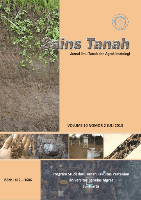
SAINS TANAH
Cultivating Knowledge for a Sustainable FutureSAINS TANAH is a renowned peer-reviewed journal that focuses on the fields of agronomy, soil science, and environmental studies, published by Universitas Sebelas Maret Surakarta in Indonesia. Established as an Open Access platform since 2001, it aims to disseminate high-quality research that addresses critical issues in soil health, crop management, and pollution, thereby fostering sustainable agricultural practices. With its current impact factor demonstrating a Category Quartile ranking of Q3 and Q4 in major areas such as Agronomy and Crop Science, Atmospheric Science, and Pollution, SAINS TANAH serves as an essential resource for researchers, professionals, and students dedicated to advancing knowledge and solutions in these vital fields. By providing a collaborative environment and upholding rigorous academic standards, the journal not only highlights the significance of Indonesian research contributions but also aims to connect local insights with global agricultural and environmental challenges.
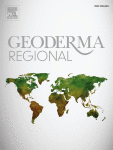
Geoderma Regional
Uncovering the vital role of soil in environmental sustainability.Geoderma Regional is a premier scholarly journal dedicated to advancing the field of Soil Science. Published by Elsevier in the Netherlands, this journal serves as a vital platform for disseminating high-quality, peer-reviewed research that spans the complexities of soil management, behavior, and the implications of soil processes on environmental sustainability. Since its inception in 2014, Geoderma Regional has achieved an impressive position within the academic community, holding a Q1 ranking in the field of Soil Science, placing it among the top 20% of journals in its category according to SCOPUS rankings. This journal is particularly distinguished for its significant contributions to the nexus between agriculture and biological sciences, reflected in its rank of #33 out of 159 in this field with a commendable 79th percentile. Researchers, professionals, and students alike will appreciate the journal's commitment to open discourse and innovative research agendas as it aspires to enhance our understanding of soil dynamics, addressing critical issues facing our planet.
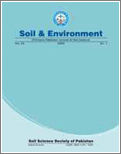
Soil & Environment
Championing Open Access Research in Soil and Environmental SciencesSoil & Environment is a distinguished open access journal published by the University of Agriculture, Institute of Soil & Environmental Sciences, located in Faisalabad, Pakistan. Established in 2006, this journal has become a vital platform for disseminating pioneering research in the fields of Environmental Science and Soil Science. With an ISSN of 2074-9546, it provides a wealth of knowledge through accessible academic articles, particularly focusing on sustainable practices and innovations that impact soil and environmental health. Although currently categorized in Q4 within both Environmental Science (miscellaneous) and Soil Science, the journal is dedicated to enhancing its influence and visibility as it progresses towards convergence years that span from 2010 to 2024. Researchers, professionals, and students will find Soil & Environment an essential resource for staying informed about the latest developments and methodologies in soil conservation and environmental sustainability. By offering publicly accessible content, the journal aims to foster greater collaboration and knowledge-sharing within the global scientific community.

Soil Research
Exploring the vital role of soil in our ecosystem.Soil Research, published by CSIRO PUBLISHING, is an esteemed scholarly journal dedicated to advancing the field of soil science, environmental science, and earth-surface processes. With an ISSN of 1838-675X and E-ISSN of 1838-6768, this journal serves as a vital platform for researchers and professionals to disseminate innovative findings and engage with contemporary challenges in soil and environmental management. The journal is recognized for its impactful contributions, as evidenced by its Q2 ranking in 2023 across multiple categories including Earth-Surface Processes, Environmental Science, and Soil Science, reflecting its influence and relevance in these critical academic areas. Operating from its headquarters in Clayton, Victoria, Australia, Soil Research is committed to fostering open access to research, ensuring wider dissemination of knowledge. As it converges toward its future objectives until 2024, the journal aims to provide a forum for diverse perspectives that enhance understanding and stewardship of soil resources, making it an indispensable resource for students, researchers, and industry professionals alike.
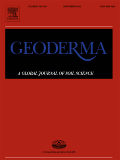
Geoderma
Elevating Soil Science to New HeightsGeoderma is a leading academic journal published by ELSEVIER, focused on the vital field of Soil Science. With an impressive impact factor and ranking as Q1 in its category for 2023, this journal stands as a prominent platform for researchers and professionals seeking to explore advanced scientific studies related to soil and its relationships with the ecosystem. Covering a wide range of topics from soil formation and characterization to land use and management practices, Geoderma is recognized for its rigorous peer-review process and is highly regarded within the global scientific community, as evidenced by its ranking of #12 out of 159 in the Scopus categories of Agricultural and Biological Sciences and Soil Science, placing it in the top 92nd percentile. With its inception dating back to 1967, the journal continually adapts and converges its content to meet the evolving demands of soil research until 2024 and beyond, providing invaluable insights for students, professionals, and researchers alike.
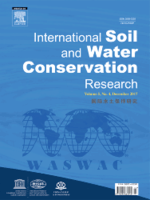
International Soil and Water Conservation Research
Exploring groundbreaking methodologies in soil and water conservation.International Soil and Water Conservation Research is a premier, peer-reviewed academic journal dedicated to advancing the field of soil and water conservation. Published by KEAI PUBLISHING LTD in China, this Open Access journal has established itself as a vital resource since its inception in 2013, offering researchers and practitioners an unparalleled platform for sharing innovative research and methodologies. With its impressive impact factor and recognition as a Q1 category journal in Agronomy, Water Science, Nature and Landscape Conservation, and Soil Science, it ranks among the top journals in its field, as evidenced by its high Scopus ranks—with ranks such as #10 in Soil Science and #12 in Nature and Landscape Conservation. The journal is committed to not only enhancing the scientific community's understanding of conservation practices but also addressing global challenges related to sustainable land and water resource management. By fostering interdisciplinary collaboration, International Soil and Water Conservation Research serves as an essential reference point for scholars, professionals, and students aiming to contribute to sustainable practices and policies in the context of agriculture and environmental management.